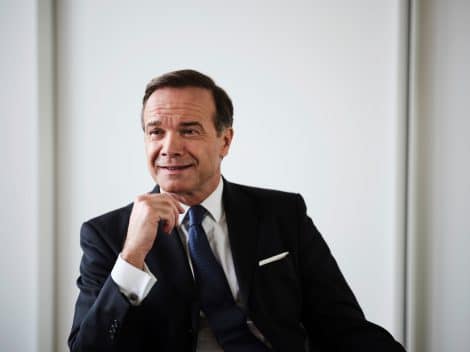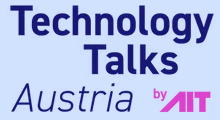Many large companies aspire to break free from the industrial-society silo-style of hierarchical management, but few do so successfully. Welser Profile, an industrial company originally founded in the 16th century and headquartered in Ybbsitz, Lower Austria, has transformed its “operating system” over the past five years, simultaneously doubling its revenue to 1 billion Euros. This is likely not a coincidence. WelserOS, which stands for Welser Operating System, represents a new way of managing. Drawing inspiration from elements of holacracy, the workforce and management jointly developed a new and evidently successful management approach that generates not only engagement but also economic success.
In the picturesque heartland of Lower Austria, we meet Nicolas Longin, CFO and Commercial Managing Director of Welser Profile, at their architecturally impressive meeting center. Nicolas Longin is one of the masterminds behind this successful transformation. Welser has been in existence for nearly 360 years, producing metal profiles industrially since the 1960s. Today, the company employs 2,700 people across five production sites in Austria, Germany, and the USA. It serves its customers through 12 sales branches worldwide. Profiles are utilized in various products and markets, ranging from wagon construction, windows, and facades to interior design and solar installations, to name just a few examples.
Enthusiastic People Shaping Opportunities for Generations
How did this motto and the successful transformation come about? The new executives (a combination of Welser family members and an external CEO/CFO) came to the realization in 2018 that the management methods that had made the industrial company successful in the 20th century needed to be adapted to the dynamic and complex world of the 21st century in order to continue leading the company to success. After numerous discussions and conceptualizations, they were ready to embark on this journey.
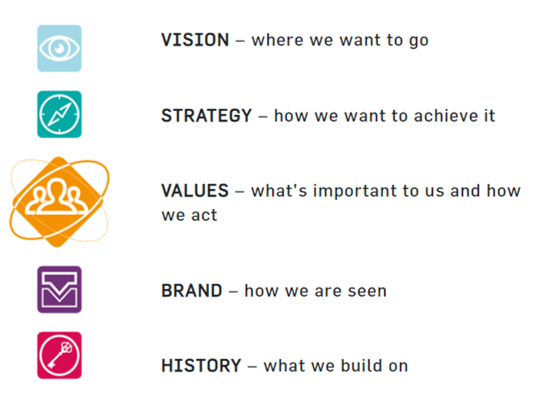
The management and the workforce spent a considerable amount of time together in over 60 workshops, discussing the past and the future. Initially, the company sought to identify the values and aspects of the past that had contributed to their success and should be preserved. For the future, they defined how values, collaboration, and success should be shaped in an era of digitalization, globalization, and climate change. The outcome of these workshops formed the “backbone” of the company, from which a new “operating system” emerged: WelserOS, which stands for Welser Operating System. The transformation process required for this was called “1Plus” and a photo on the wall of the new meeting center serves as a reminder of the kickoff days and what has been achieved together since then.
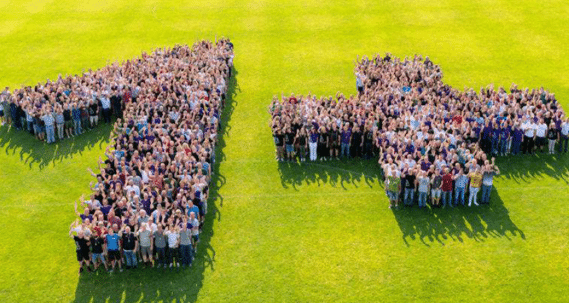
WelserOS
So how does this new “operating system” work exactly? Longin: “A process usually extends beyond a single department. This is already the norm for projects. If we delegate to department heads, then to another department, then to the involved experts, and back again just to clarify or make a simple decision, we will be too slow in today’s dynamic world. We need to focus less on ourselves and more on solutions. That’s why we manage the organization based on roles, partly independent of the departments. The respective project leader or process lead develops solutions with the teams and makes decisions together with them. However, we still have leaders in a hierarchical structure who understand leadership as enabling and empowering. They engage in discussions with their teams and discuss goals and visions, enabling everyone to make better decisions in their daily work. Over the past five years, this new management model has spread from the finance department to the IT department and is currently being implemented in all office areas.”
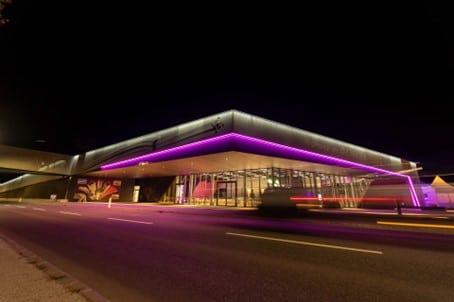
The production process has not yet been fully covered. There are highly dynamic, optimized processes in place, developed and optimized by the workforce itself. Once these optimized processes are in place, compliance with the numerous standards for Welser’s certified products is ensured.
The works council fully supports the new management model, and satisfaction is high while turnover is very low. This is not only due to the new way of working but also to the carefulness, appreciation, and respect with which changes are developed together.
“Why does it take so long?”
Gary Hamel, Michele Zanini, Steve Denning, Janka Krings-Klebe and Celine Schillinger, all thought leaders in modern management, asked themselves and the management community at the Global Peter Drucker Forum in November 2022: “We have been talking for over 10 years about how modern management positions companies for the future and makes them demonstrably more successful. And where are we now? Very few companies have made this transition. Why does it take so long?” Nicolas Longin has an answer: “Of course, changing the management model takes time. We can’t introduce a new way of managing overnight, especially not in a top-down manner. It started at Welser with many individual conversations, collecting thoughts, and then developing a shared idea.” Longin says, “Changing the way we work, collaborate, and create value is a profound transformation that raises questions. In such a process, it is important for everyone to stay in dialogue with each other to achieve clarity and find solutions. We are very connected as human beings, and it was important for everyone to find themselves appropriately in a new Welser world and to actively contribute to shaping it. Some people want to lead projects and take responsibility, while others do not. This is completely normal and corresponds to the natural distribution of personalities. There are many different types of talents, and we need them all. People who want to take responsibility are given the opportunity and thrive, delivering exceptional performance. Through these numerous conversations, we not only improved but also created an environment of trust, where so much more is achieved and so much more joy is generated, which also spreads to business partners and customers.”
We cannot “introduce” a new way of managing. We have to develop it together.
Nicolas Longin
The new “operating system” was initially tested in the finance department for a year before a vote was taken. Remarkably, over 90 percent voted in favor! This sparked interest from other departments, and the journey continued.
How does it feel for a managing director, for example, to be in a project meeting and suddenly have someone else making decisions? “You have to hold back. It is still the case that the management ultimately signs off and is responsible for the company’s results. So, if I had financial or legal concerns about decisions, I would definitely bring them up for discussion. But otherwise, the team or project leadership makes the decisions. Overall, the clear principle is that decision-making and responsibility are assigned to the same person. Anything else leads to unfavorable developments,” says Longin.
Thinking in Generations
As a family business, the focus is on long-term sustainability, and thinking in generations is part of its DNA. This became particularly evident during an acquisition in the USA. After a comprehensive due diligence examination, the acquisition was presented to the senior owners of the company. The management was asked about the impact this acquisition would have on the interests of their grandchildren.

The long-term sustainable approach of Welser convinced them, especially since Welser, now in its 11th generation, leads the company and considers the future and the coming generations in the same way. Metal, among other materials, has the advantage that it can be recycled without significant loss. Scrap metals are highly sought-after resources of remarkable value and are repeatedly made into new products. Welser interprets sustainability in its original sense, encompassing ecological aspects as well as economic efficiency and social responsibility. Welser’s forward-thinking and generational responsibility are also reflected in its role as a training company, currently training 120 apprentices in Austria over three years (with a total of over 1,000 apprenticeships already completed) and hosting 200 interns every year in its dedicated training center. The range of apprenticeships includes mechanical engineering, process engineering, machining technology, electrical engineering, technical drawing, mechatronics, and IT technology.
Beyond Budgeting
How does role-based management and working in networks, align with a traditional budget structure? The underlying idea of the Beyond Budgeting concept is that departmental “silos” are also maintained through budgets. If budgets are hierarchical and expect key performance indicators and specific outcomes from a particular budget allocation, it leads to budget owners micromanaging their teams, hindering critical cross-departmental collaboration. We wanted to know if WelserOS followed a “traditional” budgeting and accounting approach or if there was a change in this regard. It’s worth noting that our interviewee, Nicolas Longin, is also the CFO and Commercial Managing Director. “I don’t believe in traditional budgets. That hasn’t worked for a long time and doesn’t align with the reality of the world.” Interesting. So, how does Welser approach it? Longin explains, “We comply with the legally prescribed framework when it comes to financial reporting and accounting. However, within the company, we don’t have traditional departmental budgets broken down into fine details. Long-term fixed expenses, such as major projects or personnel costs, are reserved accordingly, but for everything else, we have quarterly reviews, or more frequently if needed, where we allocate resources for the next few months, typically based on projects rather than departments.” This is indeed reminiscent of the Beyond Budgeting concept, as used by Google, Swedish Handelsbanken, or Toyota, for example. “It makes us much more flexible and agile. We work in a rolling manner and avoid waste because we now invest in a targeted manner instead of trying to exhaust budgets.” By the way, Welser Profile’s annual investment volume amounts to 70 million euros.
Latest Technologies: Digitalization and AI
The goal of technology implementation is efficiency, resource conservation, and user-friendliness. Implementation projects continuously impact the entire supply chain. Examples include software-based tool management, automation in production areas, apps for support in setup processes, monitoring and sensor technology for quality control, and predictive maintenance. Artificial intelligence is currently being utilized in two areas: 1. Forecasting by analyzing internal and external data to identify patterns and facilitate learning. 2. Optimization of machine settings based on sensor data.
Through an investment in the startup Resourex, Welser Profile has enabled the procurement of steel coils through a platform and the bidding of raw material requirements on the spot market via Resourex.
Skills Shortage: Isn’t it equally challenging for all companies?
Not really. The new style of management is gaining recognition. “Our recruitment area for our management has expanded from a 30-kilometer radius to the area between Salzburg and Vienna.” We did the math: Gresten – Vienna: 165 kilometers, Gresten – Salzburg: 208 kilometers. Jobs and compensation are available elsewhere as well. Ultimately, the management style determines the decision to choose Welser over other employers and to relocate. Last year alone, Welser Profile hired 100 new employees and accepted 30 apprentices, despite the skills shortage and being located in a rural area. After an hour-long interview, it becomes clear why this is the case.
Conclusion: Just Get Started
What made us successful in the 20th century no longer works today. This applies not only to technology but also to how we manage and lead. Successful leadership is now a collaborative project. In the 20th century, change was often driven by force. There are still rumors of such “change” projects that do more harm than good to companies. In a world of complexity and dynamic development, management by a few individuals is inherently underperforming because at no point can a few people have all the necessary information and foresight, or possess the best ideas and implementation capabilities. We need everyone in order to be fast, successful, and satisfied.
The interview was conducted by xBN publisher Isabella Mader.







